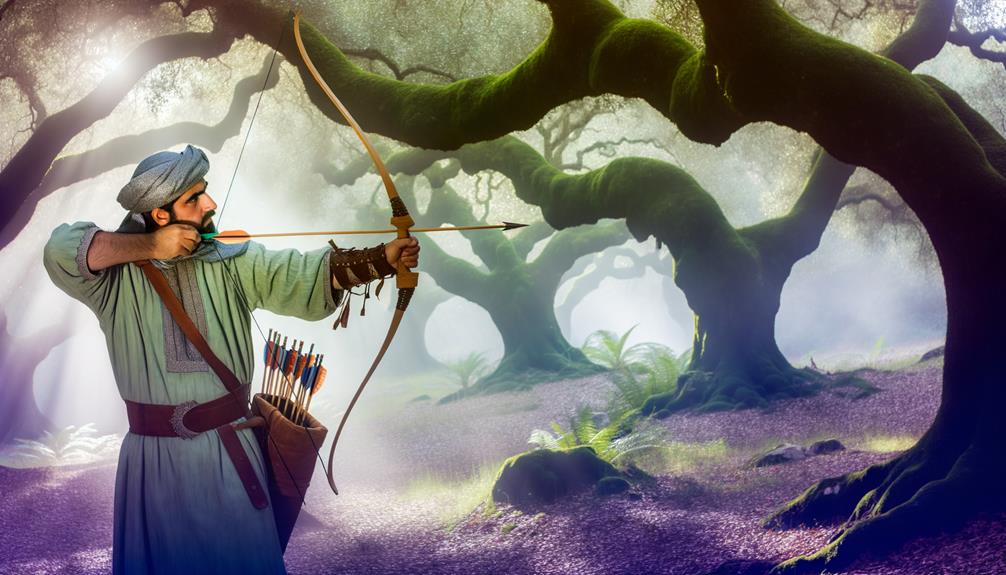Archer Name Meaning and Origin
The surname 'Archer' has its origins in the Old French term 'archier,' derived from the Latin 'arcarius,' meaning a person skilled in archery. This name saw widespread use during the Norman Conquest of England, reflecting the societal and military importance of archery in medieval times.
Archers played a vital role in battles, prominently showcased during the Battle of Agincourt, where their long-range capabilities shifted the dynamics of warfare. The name signifies both historical and cultural reverence for precision and martial prowess.
Exploring further reveals deeper connections to historical narratives and societal structures.

Key Takeaways
- The name 'Archer' derives from the Old French term 'archier.'
- 'Archer' traces back to the Latin word 'arcarius,' meaning someone skilled in archery.
- The surname 'Archer' became prominent during the Norman Conquest of England.
- Archers held significant roles in medieval military strategies, reflected in the surname's historical importance.
- The name 'Archer' symbolizes precision, skill, and martial prowess, rooted in medieval and cultural heritage.
Etymology of Archer
The surname Archer originates from the Old French term 'archier,' which in turn derives from the Latin word 'arcarius,' meaning 'bowman' or 'archer.' This etymological lineage highlights the occupational nature of the name, denoting individuals skilled in archery, a vital military and hunting skill in medieval times.
The term 'archier' was widely used during the Norman Conquest of England in 1066, further cementing its presence in the English lexicon. The evolution of the name reflects the societal importance of archery, particularly in feudal societies where archers were essential to warfare and defense mechanisms.
Consequently, the surname Archer not only signifies a profession but also invokes the historical context of medieval warfare and the socio-economic structures of the time.
Historical Background
During the medieval period, archers played a pivotal role in military strategies, shaping the outcomes of numerous historical battles and influencing the development of warfare tactics.
The longbow, a critical advancement, allowed archers to strike from greater distances with lethal precision.
Significantly, the Battle of Agincourt in 1415 demonstrated the strategic importance of archers, as English longbowmen decimated French forces, altering the course of the Hundred Years' War.
The prominence of archery extended beyond the battlefield; it also permeated societal structures, with archery skills becoming a valued asset in both military and civilian contexts.
This historical significance is reflected in the surname ‘Archer,’ denoting individuals who were either skilled in or responsible for archery, thereby cementing their legacy in history. The name ‘Archer’ also carries the symbolic meaning of precision, accuracy, and focus, which are essential qualities for a skilled archer. In today’s context, the name ‘Archer’ has also become popular as a given name, with ‘Archer’ ava name meaning being associated with attributes of strength, agility, and a sharp mind. It is a name that continues to carry the enduring legacy of those who were skilled in the art of archery. Furthermore, the meaning of Ava name has evolved to represent perseverance and determination, embodying the qualities of an archer who never gives up and always strives for success. The association with agility and a sharp mind also speaks to the adaptability and intelligence required for mastering the art of archery. Overall, the name ‘Archer’ and the meaning of Ava name continue to carry with them a sense of legacy, strength, and skill that transcends time and remains relevant in contemporary society.
Archer in Medieval Times
During medieval times, archers played a pivotal role in warfare, fundamentally shifting the dynamics of battle with their long-range capabilities.
Their rigorous training regimen included mastering the longbow, enhancing not only their physical strength but also their precision and tactical acumen.
The skills of archers were highly valued, as their proficiency could determine the outcome of conflicts, making them indispensable assets to medieval armies.
Role in Warfare
Archer units were instrumental in medieval warfare, dramatically altering the dynamics of battles with their ability to strike from a distance. Their longbows and crossbows enabled armies to inflict significant casualties before enemy forces even engaged in close combat. The strategic deployment of archers on elevated terrain or behind fortifications increased their effectiveness, allowing them to rain projectiles upon advancing foes. This tactical advantage often determined the outcome of skirmishes and larger conflicts.
| Battle | Year | Outcome Influenced by Archers |
|---|---|---|
| Battle of Agincourt | 1415 | Decisive English victory due to longbows |
| Battle of Crecy | 1346 | English dominance through long-range attacks |
| Battle of Hastings | 1066 | Norman victory aided by archery |
Archers' role was not merely offensive; they also provided essential defensive capabilities, securing stronghold perimeters against sieges.
Training and Skills
Mastering the art of archery in medieval times required rigorous training and a disciplined regimen, often starting from a young age to develop the necessary physical strength and precision. Archers underwent extensive practice to hone their skills, which were essential for both hunting and warfare.
Training included:
- Bow crafting: Learning to create and maintain their own bows.
- Strength building: Developing upper body and core strength to manage longbows.
- Accuracy drills: Practicing aim and consistency in varied conditions.
- Strategic movement: Understanding battlefield positioning and tactics.
- Endurance training: Enhancing stamina for prolonged engagements.
These elements collectively forged archers into formidable assets on the battlefield, their skills crucial in shaping medieval military strategies.
Cultural Significance
In various cultures throughout history, the archer has been emblematic of skill, precision, and often revered as a symbol of martial prowess and strategic acumen.
In ancient civilizations such as Greece and Rome, archers were integral to military formations, valued for their ability to strike from a distance.
In medieval Europe, the English longbowmen played a pivotal role in battles like Agincourt, demonstrating the strategic importance of archery in warfare.
Similarly, in Asian cultures, especially Japan, the samurai's proficiency with the bow reflected their discipline and honor.
In Native American societies, archery was not only crucial for hunting but also held ritualistic significance.
Therefore, archery's cultural significance is deeply interwoven with historical narratives of warfare, survival, and ceremonial practices.
Modern Popularity
The resurgence of archery in the modern era can be attributed to its portrayal in popular culture, competitive sports, and its appeal as a recreational activity that emphasizes skill and mindfulness. This revival has not only enhanced the popularity of archery as a discipline but also influenced the name 'Archer' to gain contemporary relevance. Key elements shaping this trend include:
- Media Representation: Iconic characters in movies and television series.
- Olympic Sports: Increased visibility through international competitions.
- Historical Reenactments: Growing interest in medieval and historical events.
- Recreational Growth: Rising participation in archery clubs and community centers.
- Mindful Practice: Perception of archery as a meditative activity enhancing concentration.
These factors collectively underscore the modern appeal and cultural significance of archery today.
Famous Namesakes
Among the notable individuals bearing the name 'Archer', several have left indelible marks in various fields, thereby enhancing the name's historical and cultural resonance.
Sterling Archer, the fictional protagonist of the animated television series 'Archer,' has become an iconic figure in contemporary media, blending humor with espionage.
Historically, Archer John Porter Martin, a British chemist, was awarded the Nobel Prize in Chemistry in 1952 for his development of partition chromatography, a critical advancement in analytical chemistry.
Additionally, Jeffrey Archer, Baron Archer of Weston-super-Mare, is a renowned British author and former politician, whose literary works have captivated millions.
These figures, spanning diverse domains such as entertainment, science, and literature, underscore the wide-ranging impact of the name 'Archer.'
Conclusion
The name Archer, rooted in the Old French term 'archier' and Middle English 'archere,' not only evokes images of medieval bowmen but also encapsulates a rich historical and cultural legacy.
Over centuries, the name has evolved from a descriptor of a profession to a symbol of precision and skill.
As modern society continues to embrace and celebrate historical names, the true depth of Archer's significance remains ever-relevant, leaving one to ponder its ongoing evolution and enduring allure.






